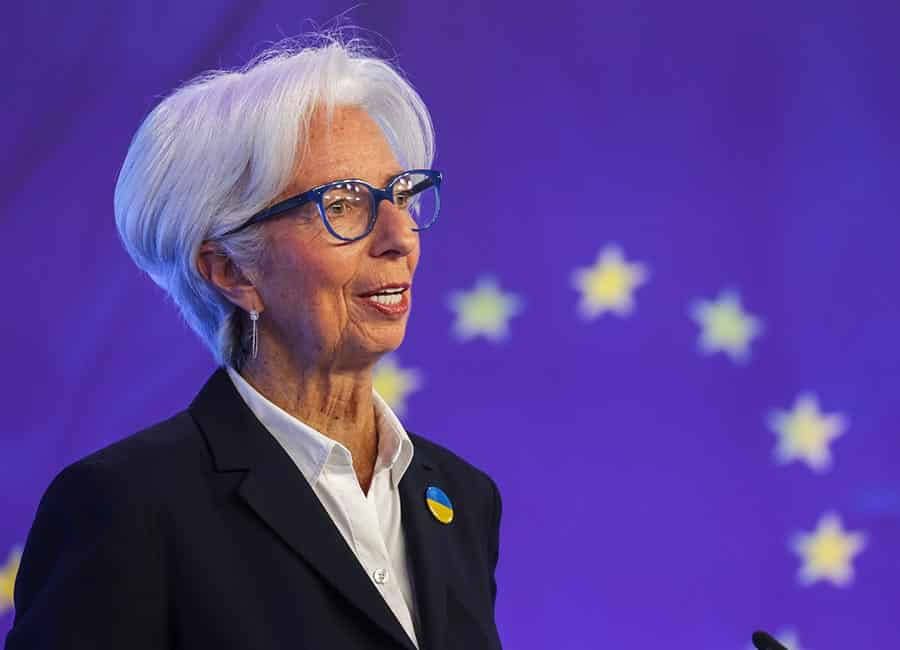A 'decisive breakthrough' on post-Brexit rules which will remove trade barriers for the North has been hailed after months of negotiations.
But pitfalls over the Northern Ireland Protocol deal lie ahead, as the DUP has yet to give it its full backing, stating that "key issues of concern" remain.
Irish Government ministers said last night that the currently suspended Stormont Assembly should return to a joint first minister arrangement - or a rotating position - if that is the cost of getting the DUP to return to powersharing.
Senior sources also cautioned that it could be months before any final deal was struck with the DUP, casting doubt on whether the Assembly will be functioning by the 25th anniversary of the Good Friday Agreement in April.
Taoiseach Leo Varadkar vowed last night that his Government will do all it can to make these new arrangements work in the interest of people across the island of Ireland, stating that the deal between the UK and the EU provided "workable and durable" solutions to issues raised by the Northern Ireland Protocol. "I firmly believe people in Northern Ireland do not want to return to divisions of the past. They want to make progress together. A shared future," Mr Varadkar said.
British prime minister Rishi Sunak and European Commission president Ursula von der Leyen agreed the new deal, named the 'Windsor Framework', which is designed to fix the post-Brexit problems that have dogged the North after an agreement was signed by former UK prime minister Boris Johnson more than three years ago.
Now, Mr Sunak will scrap his predecessor's controversial legislation to override parts of his own protocol deal, and in turn Brussels will end its legal action against the UK.
The agreement will create a new 'green lane' that will scrap almost all EU checks on goods arriving in Northern Ireland from Great Britain, ending a practice that has triggered both shortages on the shelves and political divisions.
The deal would also remove "any sense of a border in the Irish Sea" and mean that "if food is available on supermarket shelves in Great Britain then it will be available on shelves in Northern Ireland".
It will restore the UK government's full control over tax rates and state subsidies in the North, which was weakened by the controversial Northern Ireland Protocol agreed as part of the Brexit deal.
And, in a significant breakthrough, it will give the North a veto over the imposition of new EU trade laws in the region.
But the support of the DUP will not only prove crucial in restoring government to the North - it also threatens the stability of the Conservatives in the UK.
Mr Sunak said a 'minimal' amount of EU trade law would still apply, but a new 'Stormont brake' would allow the Northern Ireland Assembly to block the introduction of future EU trade laws.
Former taoiseach Bertie Ahern said the Stormont brake was a "brilliant solution" and gives Stormont the upper hand or veto, which was "a big thing" with unionists.
However, the DUP is yet to be convinced. DUP MP for Strangford Jim Shannon told the Commons: "You are my prime minister, so I say this with great respect: this is about more than just solar panels and sausages. It is crucial that the Windsor Framework which you have referred to does not become the 'Windsor knot' for us unionists in Northern Ireland."
Conservative Brexiteer Jacob Rees-Mogg warned Mr Sunak of a possible Tory revolt if the DUP does not support the deal, despite major concessions from the EU.
The former cabinet minister told GB News: "It will all depend on the DUP. If the DUP are against it, I think there will be quite a significant number of Conservatives who are unhappy."

He said that the position of Boris Johnson will be "fundamental". But Mr Johnson was noticeably silent on the new deal yesterday.
Mr Sunak said the "decisive breakthrough" would herald a "new chapter" in relations between London and Brussels.
Standing beside the prime minister, Ms von der Leyen referred to "dear Rishi" as she hailed a "new chapter in our partnership" that will foster a "stronger EU-UK relationship".
Sinn Féin vice president Michelle O'Neill has said there should be no delays in politicians returning to Stormont, while other party leaders in the North said they would take time to study the new Windsor Framework.
The political institutions at Stormont collapsed last year as part of the DUP protest against the Northern Ireland Protocol's post-Brexit trading arrangements.
An Irish Cabinet minister said last night: "The thought of Sinn Féin leader Michelle O'Neill leading a powersharing arrangement is an anathema to many unionists".
They said that this is 'an issue', adding: "It's not the only issue, but it's a problem.
"Ultimately we may have to return to a joint first minister power sharing arrangement, which existed under the Good Friday Agreement. The St Andrews Agreement in 2006 changed it to an arrangement where the party with the largest vote got the top job. The solution in my view is a joint first minister."
If a joint first minister is not acceptable, ministers say that a "rotating" first minister is a secondary option.
Another Government minister said: "I don't think Sinn Féin would ultimately block things - they would accept either option, ultimately, to get the Assembly up and running."
First minister in the Northern Ireland Assembly is, in fact, a symbolic title, as the first minister and deputy first minister have overall responsibility for the running of the Executive Office. Despite the different titles for the two offices, the two positions have the same governmental power.
But the DUP, whose support is needed to restore power-sharing in the North, reserved judgment on the deal, with the party's Ian Paisley Jr, MP for North Antrim, warning it did not "cut the mustard".
Mr Sunak said the Windsor Framework would deliver "significant improvements" for people in the North.
And he predicted that the deal could clear the way for a wider reset of relations with Brussels.
"The UK and the EU may have had our differences in the past, but we are allies, trading partners and friends," he said.
"This is the beginning of a new chapter in our relationship."
Ms von der Leyen, meanwhile, said the deal would heal the "difficulties" in Britain's post-Brexit relations with Brussels.
Image: British Prime Minister Rishi Sunak. Getty











